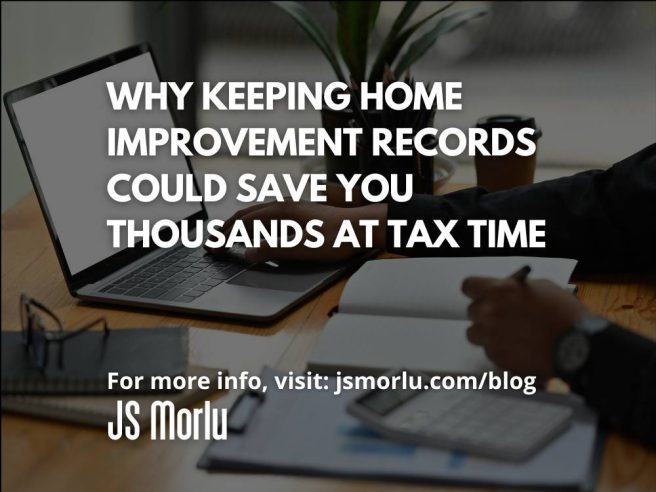Imagine this: You’re finally ready to sell your home. You’ve invested in a sleek kitchen remodel, replaced the roof, and even built that sunroom you always wanted. The market’s hot, and you get a fantastic offer. But when the IRS comes knocking for a slice of that profit, you suddenly realize—you tossed every receipt.
If you’re like many homeowners, you assume the IRS exclusion on capital gains will protect you. That assumption can cost you.
Let’s break down why keeping those dusty home improvement records isn’t just good housekeeping—it’s smart financial planning.
The IRS Exclusion: What You Can (and Can’t) Deduct
Under current tax law, homeowners can exclude up to $250,000 in capital gains from the sale of a primary residence—or $500,000 if you’re married filing jointly. This isn’t a deduction—it’s a full exclusion from income. To qualify, you must:
- Own and live in the home for at least two out of the last five years before the sale.
- Not have used the home sale exclusion in the past two years.
This rule resets every time you sell your primary residence (assuming you meet the time requirement). You can use it again and again.
But here’s the catch: if your gains exceed those thresholds, any overage is taxable—and you’ll want documentation to reduce that gain.
Why Records Matter: What Happens When You Exceed the Exclusion?
Meet our fictional friend Terry, who bought a home in Fairfax for $400,000 twenty years ago. Over the years, Terry added a $50,000 home theater, spent $35,000 finishing the basement, and landscaped the backyard for $25,000.
Now Terry sells for $800,000. The $400,000 gain seems protected—he’s single, so he figures the $250,000 exclusion covers most of it. But that leaves a $150,000 taxable gain. That’s where those improvement records matter.
Because Terry kept his receipts, his cost basis increases by $110,000 (the improvements). Now, instead of a $150,000 gain, the IRS sees just $40,000. That’s a massive reduction in tax liability.
When You’ll Really Regret Tossing Those Receipts
Even if you think your sale will stay under the exclusion limit, the following scenarios could surprise you:
1. Long-Term Ownership
If you’ve owned your home for decades, appreciation and inflation alone might push your gains above the exclusion.
2. Converted to a Rental
Planning to turn your home into an income property? You’ll need your improvement records to calculate depreciation accurately.
3. Converted to a Second Home
Once it’s no longer your primary residence, that $250K/$500K exclusion may no longer apply.
4. Casualty Loss
After a fire, flood, or other disasters, records help prove pre-loss value, making them crucial for insurance claims and tax deductions.
5. Short Ownership Period
If you sell before hitting that 2-out-of-5-year mark, the exclusion might not apply at all—or only partially.
6. Divorce Situations
After a divorce, only one spouse may qualify for the $250K exclusion—meaning you’re more likely to exceed the limit.
7. Changing Tax Laws
Future legislation could reduce or eliminate current exclusions. Your documentation might be your only shield against tax creep.
What Counts as an Improvement?
Here’s a general rule: Improvements add value, prolong the home’s life, or adapt it for new uses.
✅ Examples of eligible improvements:
- Kitchen remodels
- Bathroom renovations
- Room additions
- HVAC systems
- New roofs
- Landscaping
- Installing energy-efficient windows or skylights
🛠️ Pro tip: Even smaller items like new ceiling fans or upgraded lighting can count—just keep the receipts.
🚫 Not eligible:
- Repairs and maintenance (painting, fixing leaks, replacing broken windows)
- Items already claimed as tax credits or deductions (e.g., solar panel credits, ADA upgrades)
Keeping Records the Smart Way
You don’t need fancy software (though it helps). A labeled folder or even a shoebox will do. But we recommend digitizing your receipts with a cloud service or secure file storage.
Key items to save:
- Invoices
- Canceled checks
- Credit card statements
- Before/after photos
- Contracts with contractors
JS Morlu Tip: If You’re Unsure, Ask
Tax law is full of nuance. For example, certain military or government employees may qualify for extended periods beyond the typical five years. If you’ve sold a home under unique circumstances—job relocation, health emergency, etc.—you may still qualify for a partial exclusion.
At JS Morlu, our proactive tax planners help you:
- Determine eligibility for the full or partial exclusion
- Accurately calculate your cost basis
- Strategically plan improvements to enhance tax efficiency
Final Word: Shoebox Now, Savings Later
No one loves organizing old receipts. But failing to document your home improvements could turn a tax-free windfall into a costly mistake. For high-net-worth individuals and business owners juggling multiple properties, this becomes even more essential.
Let’s make sure your next sale is as tax-smart as it is profitable.
Need Help Preparing for a Home Sale?
Whether you’re planning ahead or already under contract, JS Morlu’s tax advisors can help you calculate your home’s adjusted basis and minimize your tax bill. Contact us today for a personalized consultation.
JS Morlu LLC is a top-tier accounting firm based in Woodbridge, Virginia, with a team of highly experienced and qualified CPAs and business advisors. We are dedicated to providing comprehensive accounting, tax, and business advisory services to clients throughout the Washington, D.C. Metro Area and the surrounding regions. With over a decade of experience, we have cultivated a deep understanding of our clients’ needs and aspirations. We recognize that our clients seek more than just value-added accounting services; they seek a trusted partner who can guide them towards achieving their business goals and personal financial well-being.
Talk to us || What our clients says about us

